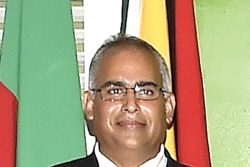This week an article in Stabroek News listed the price of tomatoes at currently $600 a lb and suggested that demand from onshore and offshore oil workers was driving up costs for this and perhaps other vegetables, many of which have increased even more than tomatoes which were once selling for $140/lb in March 2017.
Many observers have noted the general increase in prices for all goods and services even if the Bank of Guyana continues to claim, against all the evidence, that annual inflation is 1.7%.
These sharp price increases appear related to internal and external supply side issues, however it may well be that increased demand from the larger number of foreign workers is now driving up prices. If this is the case then we are going to see an even higher cost of living which will hit the working poor hardest.
That is because a recent report by the Migration Policy Institute estimates that for Guyana to reach its full growth potential it will need to attract a minimum of 100,000 to 160,000 migrant workers. Whatever the scenario there is no doubt migrant workers will be needed because the report also states “Even if the country were to harness all unemployed, underemployed, and discouraged Guyanese workers, domestic supply would only amount to 63,500 workers.”
Even 50,000 foreign workers would put tremendous strains upon the capacity of our food supplies, housing stock and road systems, along with social services such as health care. This will be a growing problem going forward and one that the current administration seems to have thought little about.
The term in the report of “full growth potential” is somewhat vague but we assume it means a maximisation of the country’s economic growth and that these migrant workers will be flown in to build the critical infrastructure needed to make this happen. This would certainly jive with the President’s goal of the rapid transformation of the economy via strategic infrastructure
President Ali loves to sprinkle around this word “transformational” – “transformative infrastructure”, “transformational agenda”, “a national transformational construct”, “a transformational move” – as if it were some gold dust that will deliver the people from our post independence purgatory; that we would within a decade be a new Dubai, all glass and mirrors.
But the question is can we as Guyanese afford his vision? Have Guyanese been consulted on whether we want this “full growth potential” path? Do we want more office buildings in Georgetown with their demands on sewage and parking? Have we been asked our opinions on the wisdom of an industrial park at Wales, a deep water harbour in Berbice? A stadium? An oil refinery in Linden?
Take Minister Edghill’s recent announcement of the widening of Independence Boulevard and Cemetery Roads. This is what he decreed to residents there: “Cemetery Road, we are now upgrading it, both of the carriageways from Princes Street all the way out to Mandela Avenue. We are ensuring that you can get traffic two lanes going and two coming, so Cemetery Road is turning into a four-lane.”
“Albouystown must move from being a shantytown into being part of the development of the Georgetown city as this country modernises. We are making this community attractive, so your property value must go up. People who didn’t want to come and live in this neighbourhood, when they see how it looks: properly lit, green spaces for children to play, safe neighbourhood, they would want to start moving in. And with oil and gas and the expansion, some of those international companies must come to Albouystown and start setting up offices and building office complexes right here for you to be able to get jobs.”
There really is quite a lot to unpack here. Apart from his insulting description of the neighbourhood as a shantytown, one wonders whether the residents were ever consulted if they wanted a highway rammed through their communities. As for house values, how does that make them richer when house prices are already sky high elsewhere? Or is he encouraging them to sell out to corporate interests? The likely purpose of these two road widenings is to de-bottleneck traffic coming into Georgetown – Cemetery Road being a long-time short cut for East Bank commuters. In other words this is for their benefit and not for the residents who will live with more noise pollution and actual pollution along with the increased danger to themselves and children from vehicles. It is a microcosmic example of this government’s tendency to foist upon the people what they want rather than listening to community concerns and interests. One cannot help but conclude that since they are receiving the oil revenues directly they no longer feel the need to ask the citizens a single thing.
This economic transformation is their vision, not the people’s. We are simply passengers in the back of the PPP/C’s bus just as we were previously under the coalition’s. One might accept that the government of the day has a right to make many decisions unilaterally, based on the winner takes all system we are burdened with. However, for such overarching issues as the very nature of this country’s future it is simply not acceptable that to date there has been no genuine debate among ourselves as to what kind of country we want to live in. An election based on competing manifestos does not count.
Now more than ever we need some consensus because what is underway here will change how we and future generations live and feel about our country. The argument the government would proffer is that there is no time for such a debate, but what exactly is the rush?
If ever there was a time it would be for another National Development Strategy, the 1996 publication that contained the views and visions of a large cross-section of Guyanese and stated from the outset that “The major obstacle to Guyana’s development is to be found in the divisive nature of its politics.”
One would have thought 20 plus years later our democracy would have progressed to include more consultation, more inclusivity. But no, the President has declared, only two years in, that he is already “beginning to get tired of the naysayers”.
Anyway there’s not going to be any transformation, just a few more fast food franchises, another dreary mall here or there, a government approved private plane…a veneer of affluence barely covering the chaos and daily injustices that make living here so hard.
The problems of Guyana will not be solved by concrete. We don’t need more highways, we need less cars. We don’t need a new city built on sand, we need our historic but wounded capital to be clean and orderly. We don’t need a specialist hospital for tourists to get liposuction, we need 94% of health facilities to actually have access to treated water – we dare not even ask for universal potable water (that’s a pipe dream). And right now we need affordable tomatoes.






